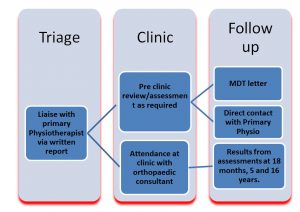What is Physiotherapy?
A physiotherapist works with children who have spina bifida and their families to maximize function, minimize complications and improve participation and quality of life.
A physiotherapist assesses and treats through assessment of range of movement, posture, sensation, tone and power (muscle charting). From this the physiotherapist will identify your child’s strength and area of needs and provide advice and exercise programmes to promote same.
Physiotherapists will support you and other relevant people such as teachers, coaches and SNAs to help your child develop their independence and functional skills that are important to your child and you.
When do I see the spina bifida physiotherapist?
The Physiotherapist will see all children with Spina Bifida on initial admission to CHI at Temple Street. The physiotherapist will review all children with spina bifida when there is an acute need when they are inpatient in CHI at Temple Street. The physiotherapist will review your child as an outpatient at 18 months, 5 years and 16 years of age. The physiotherapist will also review you child as an outpatient if the need arises.
Role of the Physiotherapist in the spina bifida clinic

Screening
The physiotherapist receives a referral for all clients attending the clinic. The physiotherapist sends a report to the child’s primary physiotherapist. If the child is not linked in with a community physiotherapist, the physiotherapist will invite the child to a pre clinic assessment. Information gathered will include how the child is moving their joints, their posture, their tone and their power and how they are participating in everyday activities in their home and school environment, and what equipment the child uses e.g. hoist, banana board, orthotics and walking aids.
If the physiotherapist does not receive contact from the primary occupational therapist or parents prior to clinic, screening will be completed at the clinic with the child and parents.
Assessment
The physiotherapist will complete assessment focusing on concerns identified during the screening process. Physiotherapy concerns include but are not limited to:
- A child with decreased range of motion at risk of contractures and minimize risks of complications
- A child with significant difficulties participating in independent functional skills, difficulty participating in everyday activities in home and school who is not linked in with local services.
- Equipment not meeting child’s mobility needs – orthotics, mobility aids
- Primary physiotherapist has requested a second opinion.
- Spina bifida team would like a Physiotherapist’s opinion to make an informed decision for further interventions.
- As per orthopaedic consultant: assessment at 18 months, 5 years and 16 years.
Depending on the area of concern the physiotherapist will book an assessment appointment on the morning of the clinic or jointly with another member of the team in the clinic e.g. spina bifida nurse, consultant orthopedic surgeon, consultant pediatrician in the physiotherapy department.
Follow up
- If immediate follow up is required, the physiotherapist will contact the child’s local physiotherapist via a phone call as soon as possible.
- The physiotherapist will provide a feedback form with an update on clinic findings which may impact on future planning for local teams and future participation.
Research
The physiotherapist is involved in data collection to explore children with spina bifida’s muscle mapping in the newborn period, 18 months, 5 years and at 16 years of age. This will help us understand individual children, and the needs and abilities of our patient group as a whole.
